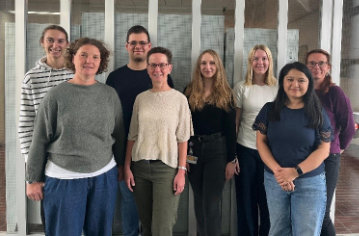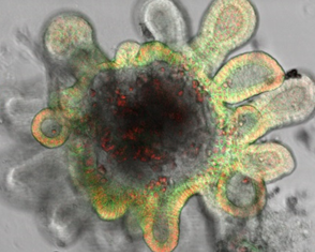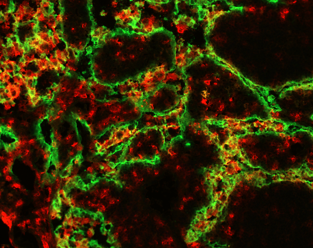Our research focuses on unraveling fundamental immunological concepts of the mucosal immune system, particularly the immune responses in the intestine and its associated draining lymph nodes, the mesenteric lymph nodes. Disruptions of this intestinal immune system, triggered by genetic alterations or bacterial interactions, can lead to inflammatory and chronic diseases. The intact intestinal barrier is crucial as it constantly confronts our immune system with external influences such as allergens, microbes, and food antigens. Managing this complexity poses a challenge for both the innate and adaptive immune systems. It is crucial for the immune defense system to combat pathogens while maintaining tolerance to a variety of antigens. Failure of these tolerance mechanisms can lead to various diseases, such as inflammatory bowel diseases. Our research encompasses state-of-the-art techniques as well as in vitro and in vivo model systems to examine various cell types present in mucosal tissues at cellular and molecular levels.
Topic: Barrier Integrity
A central focus of our work lies on the intestinal barrier, consisting of various epithelial cell populations and being of critical importance. Disruptions of this epithelial barrier, whether through bacterial contact or genetic alterations, can lead to inflammation. Therefore, we investigate the role of genetic factors in maintaining the barrier, utilizing both intestinal organoids and a "Gut-on-a-Chip" system.
The use of intestinal organoids led to another goal, which is now being pursued by the EasyOrganoid innovation network. This network aims to facilitate the use of organoids in research and teaching - among other things, through a cost-effective, modular system for incubation and imaging, as well as accompanying e-learning offerings.
Topic: Stromal Cell Immunity
The mesenteric lymph nodes play a pivotal role in the intestinal immune system as they determine whether an immune reaction or tolerance to antigens is triggered. Of particular importance are the stromal cells, whose immunological function and interaction with other cells are not fully understood. We analyze stromal cells from various lymph nodes to better understand their commonalities and differences regarding immunological processes.

PD Dr. rer. nat. Manuela Büttner
Group leader
Phone: +49 511 532 7389
E-mail: Buettner.manuela@mh-hannover.de
Ayman El-Cheikh Ali
Student
Phone: +49 511 532 3937
Mandy Holzberger
PhD student
Phone: +49 1761 532 7393
E-mail: Holzberger.Mandy@mh-hannover.de
Mariella Mock
FWJ
Phone: +49 1761 532 3937
E-mail: Mock.Mariella@mh-hannover.de
Dr. Manasa Nandimandalam
PostDoc
Phone: +49 511 532 3937
E-mail: Nandimandalam.Manasa@mh-hannover.de
Yvonne Nicolai
Lab technician
Phone: +49 511 532 3937
E-mail: Nicolai.Yvonne@mh-hannover.de
Puja Pandey
PhD student
Phone: +49 1761 532 7393
E-mail: Pandey.Puja@mh-hannover.de
Anabel Peine
cand. med.
Phone: +49 1761 532 7393
E-mail: Anabel.M.Peine@stud.mh-hannover.de
Anja Siebert
Lab technician
Phone: +49 1761 532 3937
E-mail: Siebert.Anja@mh-hannover.de
Former Members
Maria Mellin
Dr. Pia Pascale Peppermüller-Rindler
Mara Menzel, B.Sc.
Elena Hartmann, FWJ
Verena Bauer
Ole Riemer, cand. med.
Jonathan Gehring, cand. med.
Please find all our publications on Google Schoolar.
Funding
- EFRE, EasyOrganoid - Teilprojekt EasyOrganoid - Biologische Validierung und Transfer 2025 - 2028
- MWK, R2N „Replace“ und „Reduce“ aus Niedersachsen 2023 - 2026
- BfR, 2022 - 2025
- DFG, BU3177/3-1, 2021-2024


